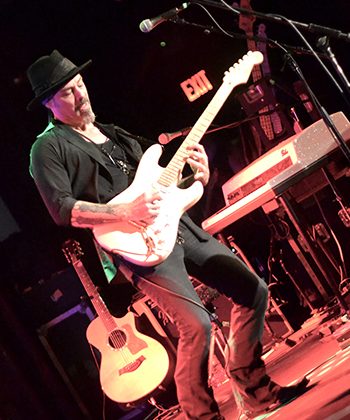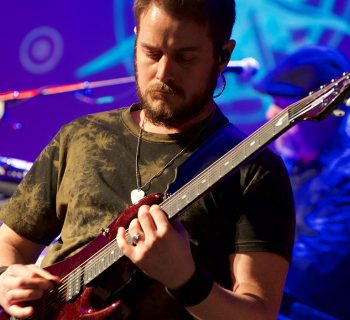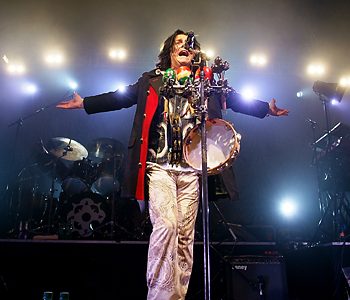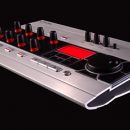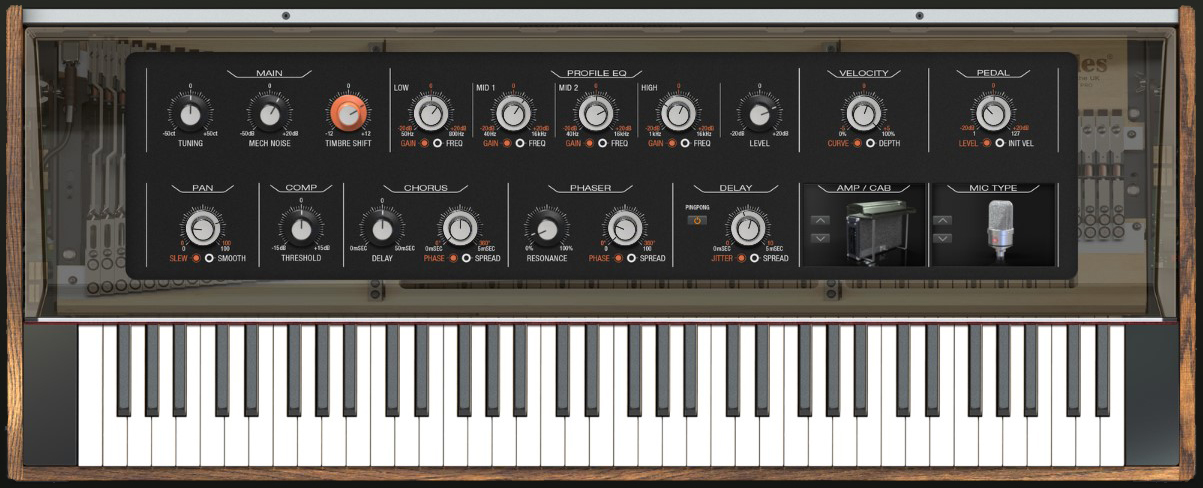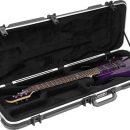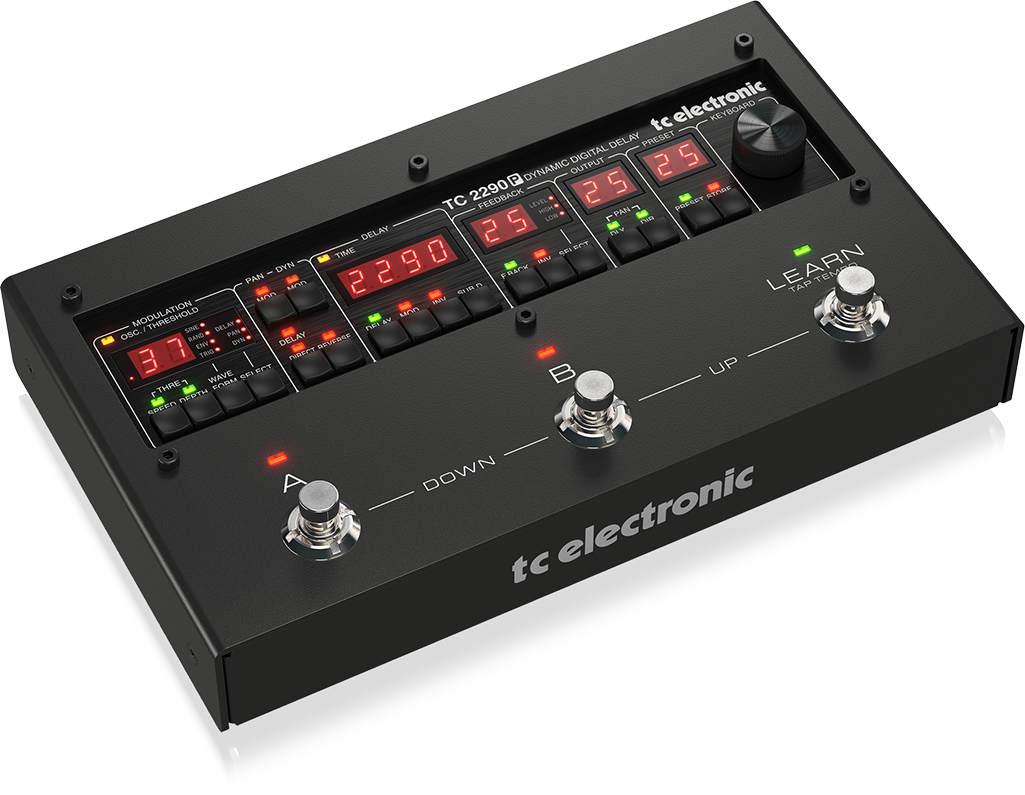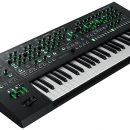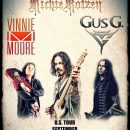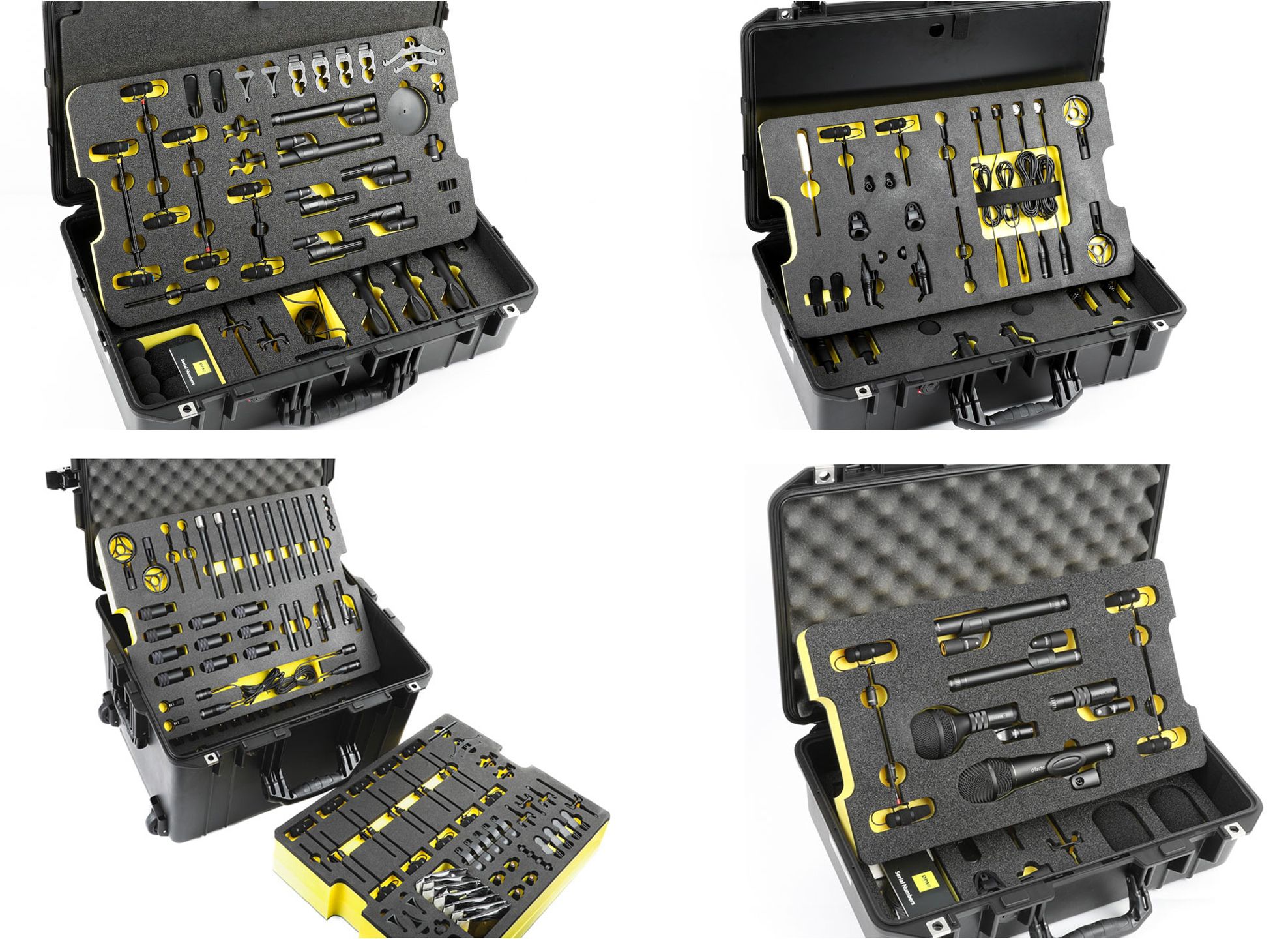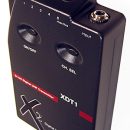In entertainment, we have seen numerous examples of the triple threat: an actor who can act, sing, and dance. They are considered highly talented, and are praised for excelling in multiple creative fields. But in the guitar world, a guitar player who can sing fantastically, write great songs, and shred his ass off? You know this triple threat list is a pretty short one.
Richie Kotzen rightfully deserves a place on this list. Discovered by the legendary Mike Varney of Shrapnel Records fame, Kotzen has played guitar in such notable bands as Poison, Mr. Big, and Winery Dogs, while also pursuing a significant solo career, in which Kotzen has ample space to display his diversity. Kotzen’s solo material is genre blurring, combining blues, hard rock, r&b, and jazz fusion.
We caught up with Kotzen at the world-famous B.B. King’s in Times Square, NYC, and had a chance to learn more about the musical path that has led to his current, fantastic solo record, Salting Earth. We were also treated to his performance that same evening and observed first-hand how he wows the audience with soulful, multi-octave vocals, brilliant piano playing, jaw dropping guitar licks, and all while making it look quite elementary.
You can be successful as a musician in different environments as long as you’re allowed to be who you are and do your thing.
MPc: Coming up in Pennsylvania, did you have a hard time finding other musicians to play with?
RK: Well, actually, no. When I first got to the point where I was ready to try to play with other people, I might have been like in 7th grade or something. There was a guy who I’m still very close friends with by the name of Corin, and he was a few grades above me. So we had our first band and we found a drummer, a bass player and there was the four of us. We played little fairs, like local fairs. One time my dad had a grand opening of a business and we went on the lawn and the radio station was there. We were playing an Elvis tune. And for some reason I never forget, the guy was, I heard him say, “Well, these guys are good!” Because we were a bunch of little kids. And it was fun! That was my first band.
And then what happened was that there was another band, older guys, saw me play and then they got involved. So then by the time I was 15 I was in a full-time working bar band, playing four nights a week, making good money, too. I mean, we were a top 40 band, and we were really good! I was, like, 15 and everybody else was in their 20s. My father would go to all the gigs, and he would book the band. He’d have to be there because I was a minor.
But we played everywhere. There was a great club in Reading called The Silo. And we used to pack that place. There were a lot of places to play. We played Hammerjacks in Baltimore. Remember that place?
MPc: No, sir.
RK: Hammerjacks? You never heard of it? [laughs]
MPc: No. [laughs]
RK: It was really cool. But there were a lot of places to play.
MPc: Did you have any formal music education?
RK: When I was little, the first thing I did was find a teacher and so I was about 6 or 7 years old. I’d go to my teacher, Larry, and he’d teach me. And then I stopped once I started playing… and I had another teacher, actually, when I was in my early teens that I went to.
But then once I got busy with my band and we were playing four nights a week, I couldn’t really do the guitar lesson thing anymore. And I was actually learning more just by listening to stuff and playing with other guys.
MPc: How old were you when you left Pennsylvania and started your career as a full-time musician?
RK: Well, I started my career as a full-time musician when I was 15 in that band that I talked about. We were playing four nights a week and I was making real good money for 1985. We really ran it like a business. So we had ourselves on a payroll. All the money went into the account and then we just, it just worked like a machine and we were all on salary and it was great. So by the time I was 15, I was a full-time working musician.
MPc: That’s amazing.
RK: And I went to school on a half-day program. So I would go to school, leave at 12:30, and I was supposed to be going to a job, but I was really going home and I was going to bed. And then I would sleep until about seven o’clock, get up and drive to Jersey or wherever, or maybe, if it was a local gig, it would be Reading, but I remember we played this place in Jersey that was… we had to play until four in the morning.
So I’d be up all night playing and then I’d go right to school. And after gigs, it was a weird schedule for a while. But I did graduate high school.
I moved out of Pennsylvania in around ’90, ’91. I got signed to Interscope Records. They gave me a little bit of advance money and I used that money to move to Los Angeles.
Richie Kotzen performing at B.B. King's in NYC, May 2017.
MPc: Were there struggles that stand out in your mind when your career was just getting off the ground?
RK: You know, it’s funny. The struggles kind of were in the middle. So, it’s interesting you asked. In the beginning, things were very simple. I would set little goals and I would achieve them. My first obsession was trying to get into Guitar Player Magazine. They had a column called “Spotlight or New Talent.” And I just kept sending tapes, kept sending, and finally they featured me. My next obsession was to try to get a record deal, and eventually I did that.
So, for a while, all these little goals that I set worked until the mid-Nineties. Then I started really running into some problems. So that was a real rough patch. Thankfully I had earned enough income from previous records and other things that I had done that I was financially sound, but my career was in a lot of turmoil with trying to get a new record deal, once the Geffen deal went south and I was trying to make the music I wanted to make and they had this perception of me being a certain kind of artist, and I really wasn’t [that]. It was just this horrible nightmare in the Nineties dealing with record executives trying to tell me, “No, you’re this kind of artist.” And I’m, like, “No, I’m not. I don’t write those kinds of songs. I don’t sing that way. You’re out of your mind!”
So it was a horrible time and it really wasn’t until the Internet opened that I kind of got my career back under control. I was able to make records without a record company and get them to the fans. Then suddenly I started getting offers to go tour in Europe. So I spent many, many years touring Europe on and off, riding all over the place in a van, and that built up, and then suddenly I started going to Latin America and doing the same thing. And Japan, too.
But the ‘90s were really—after I was already known, I went through this period in the ‘90s that was very rough. Now, things couldn’t be better. They’re perfect right now.
MPc: That’s very good to hear! I just want to touch on briefly, when did you decide to stop using guitar picks?
RK: [laughs]
MPc: And why?
RK: Well, maybe over… Well, I always would do certain things without a pick in recordings. And even live, I would hold the pick and do some finger-type things. So it’s always been part of my repertoire.
It was ten years ago at least where I went and decided, I’m going to try and get through a show without a guitar pick. The reason I did it, I was just unhappy with what I was playing. I felt like my playing had got to a point where I was starting to go backwards. I needed to do something to change my perspective. I was already on tour in South America. I knew sitting in my hotel room practicing for an evening was not getting me where I needed to go. And I thought, what can I do? Well, what if I don’t use the guitar pick? And I knew right away, it’s going to slow me down. Force me to play… well, force me to play slower. And to phrase differently.
So I did the set and I couldn’t do any alternate picking, I couldn’t do any of the sweep picking stuff that I’m known for. It did slow me down. I started phrasing more musically. I really enjoyed it! I liked the way the guitar sounded and I liked the connection that I had with the instrument.
So over the years I went and thought, well, now that I’m doing this, how can I get some of my old techniques back? Alternate picking, some of the sweep picking, the legato stuff didn’t change. And so I went back and worked on my right hand a little bit. It opened up so many new doors in my playing that, you know, there’re actually things that I play now that you can’t do with a pick.
So it’s kind of fun! The real reason was just to get better and explore a new avenue.
MPc: Fantastic! I want to ask you about a project you did some time ago with [Grammy award-winning] drummer Lenny White and bassist Stanley Clarke, Vertú. Even given your heavy jazz infusion influence in your music, was the situation more challenging for you than your solo band, or something like Winery Dogs?
RK: Well, yes and no. You know, it’s interesting. That gig, anytime I’ve ever played with anyone in the style that’s not necessarily a style that I grew up in, like jazz, it was because I was doing something that made sense for that music. The way that I instinctively hear and instinctively play somehow made sense with what we were trying to achieve on that record. Which, I would say, was more—it’s not a jazz record. There’s elements of jazz, but… it’s not a rock record, either, but there’s elements of rock. You know what I mean?
So I think, for that kind of music, I was probably the perfect guy for that record, because that’s the direction that we wanted to go. If it was a straight-ahead jazz record, I would not be the right guy for that. The same way the straight-ahead jazz player wouldn’t be the right guy for that record, either.
So that’s the thing that I’ve learned over the years, is that you can be successful as a musician in different environments as long as you’re allowed to be who you are and do your thing.
There are guys that can do a little bit of everything, and usually those guys get a lot of gigs, but those are not stylist kind of guys. You’re not going to hear that guy playing and say, “Oh, that sounds like Richie Kotzen.” Whereas someone like me, when I play something, it sounds like something I would do. And people say “Oh, that sounds like Richie Kotzen.” At the same time, I would not be good in a situation where I would have to wear many hats and—not that I couldn’t physically do it, but it’s not in my mindset.
For me, the thing that excites me about doing what I do is the creative process, being able to do my music. So the long-winded answer to your Vertú question, the reason that worked, was because those guys wanted me in the band. When they heard me play, it’s like, that’s the sound that we want for this particular thing, and that’s why it worked.
The people that are going to buy my record don’t even know Poison songs.
MPc: Tell us about opening for the Rolling Stones. That had to have been otherworldly.
RK: Mm-hmm. You know, it was funny. Because I really believed, even when I got to the stadium and I saw my equipment there, I really believed that there was a huge chance that it would not happen. Because up until then, they never had an opening act in Japan for that band. Opening acts in Japan actually are not common. I’ve toured Japan many, many times, as a solo artist, as a member of Mr. Big and with the Winery Dogs, and never with an opening band. So, in Japan it’s something that’s not normal.
After we did the first show, then I knew, okay, I can tell my friends that I opened for the Stones, because it already happened! It’s like a weight was lifted. I think there were five or six shows that we did, I was there for three weeks. And it was really cool, it was really nice.
MPc: Very cool. Last, about some other past stuff: Tell us about filling a literal tall order with Paul Gilbert [Gilbert is 6’ 4”] of Mr. Big. How was that gig for you? Did you feel you were a good fit for the band?
RK: Again, it ties exactly back to the thing we were talking about earlier with Stanley Clarke. Initially, when they asked me to join Mr. Big, I said no. I had taken so much blowback when I left Poison. When I left Poison, the idea of being in an ‘80s band was like the kiss of death. I lost record deals because of it. It was a double-edged sword, because it got me known, but when all that stuff went south, it became a bad stigma to carry. And unfortunately, the record executives couldn’t see past that. I would argue “The people that are going to buy my record don’t even know Poison songs, trust me!” They wouldn’t trust me.
So because of that, because Mr. Big was a part of that pop metal thing in the ‘80s and very successful, I still didn’t want to tie myself to that again. And then we had a meeting and they came in and said, “Listen, you’re not going to stay in the band. We only really operate in Japan.” Back then, at that point, they would make a record, put it out in Japan and no one in the rest of the world would even know about it.
So I ended up playing and did two studio records and a couple live things. It was interesting. I didn’t love the experience of being in that band. There was a lot of internal friction and it just wasn’t the most fun. I mean, oddly enough, with all the crazy shit that was reported in the press with Poison, when we made that record [Native Tongue], that was a lot of fun, and we had a lot of fun as a band! It really felt, for a period of time, it really felt like a band. It was really cool. With Mr. Big, it never really felt like a band. It always felt like four people, islands unto themselves, and very awkward.
But I think we still made some cool records. It was really primarily a Japan thing. We did a couple of shows in the United States, a couple of warmup shows. We tried to do an East Coast tour. But I think that band is much better with the original members. Now they’re back with Paul and I think because of what they do and how they do it, it’s so stylized. I think I did a nice job when I was in the band. The direction certainly shifted a little bit just because of me being there, with the new music. But when I think of Mr. Big, I think of Paul Gilbert and Billy Sheehan together. I think that’s a pretty powerful matchup.
MPc: Oh, no question about it. Fast forward to today and tell us about the new record.
RK: Well, the new record, I’m very excited about it. Salting Earth. Apparently it’s my 21st solo record, but I think there’s probably more because I put out other records that were disguised as band names. So who knows how many there are!
I really am happy with what we did. When I say “we,” I’m talking about myself because I’m the only musician on the record. I had the luxury of really taking my time. When you have no deadline, you really have an opportunity to make the record that you want to make. You know that every note on that record, once you put it out, was a deliberate choice, and so that’s what we have there with that record.
MPc: Okay. Did you engineer and mix the record as well?Richie Kotzen, Salting Earth
RK: I did. That’s why it sounds the way it does.
MPc: Fantastic!
RK: [laughs] That’s funny.
MPc: Which guitars, amps, and effects did you use on Salting Earth?
RK: I used my signature model Fender Strat and Telecaster, as well as my Tech 21 Fly Rig. I used Fender and Marshall amplification on the record—Fender Vibrolux and Vibro King, and a Marshall 1974x.
MPc: What’s different about your signature Telecaster than, say, a standard Telecaster?
RK: Well, there’s specifications. The neck dimensions. The wood. The comfort cuts are put in the guitar, almost like a Strat, so it’s not so square. The pickups. The way it’s wired. All things that I took my original Telecaster and altered and made it the way I wanted it. And so the fret size is a custom specific thing. There are just little tweaks that I made.
MPc: Understood. You had a signature Cornford amp in production a few years ago. Are you still using it?
RK: Occasionally. I used it on the last Winery Dogs tour. I used it on the last Winery Dogs record in conjunction with some other amps. I have the same technician that made that amp is now designing a new signature model amp with me, with a company called Victory. So he’s working that out, which is very cool. And I’m playing with it tonight.
MPc: Tell us about your signature Tech 21 RK-5 Fly Rig. Has it saved your life?
RK: [laughs] Sometimes, yeah, that’s a great little product and it really stemmed from an idea that I had when I took a crude electric box and put my overdrive and my delay and my switching mechanism for my Fender amp in one little box so that I could just carry it for my fly dates that I was doing at the time. So hence the name the Fly Rig.
Andrew from Tech 21 came to my house one day and saw it and he said, “oh, I can make that. I can make it much better”. And so he did it correctly. And here we are with the Fly Rig. I love it. It’s convenient and the hardest thing was getting the overdrive right. Took a lot of time, but we got it right.
MPc: Songwriting approach. How different is it working on solo material versus working with a band like Winery Dogs when you’re songwriting?
RK: Well, I think when you’re writing alone, there are no limitations. When you’re collaborating, there are [limitations] just because of what collaborating is, there are limitations. Especially with the way we write in the Winery Dogs, because we go in a room and we jam ideas. And they like to take those ideas and structure a song form on the spot. Now, for me, without having the lyrics and the melody, to commit to the structure of a song before that exists is kind of like putting the cart before the horse. It ends up as some… for me, it’s a little awkward. But I do it and, in doing that, you tend to come up with some things that you normally wouldn’t have done on your own, so that’s the beauty of it.
With the way that I—and this is true for anyone—if you’re one guy with a concept and you see it from start to finish, you’re not going to argue with yourself. You’re not going to debate yourself. You’ll know if you like it or if you don’t like it. But it’s just a much more simplistic thing.
But they’re both very valuable. Some people can’t write on their own. So collaborating is the only option.

Richie Kotzen performing at B.B. King's in NYC, May 2017.
And then in collaborating you end up with some things that you never would have heard before. For example, the song “Hot Streak.” Billy was simply sitting there playing that lick. He was looking at that as an exercise to warm up with. I heard it as a song. I said, wait a minute. Mike, put a beat to that. And now, okay, play that ‘till I say stop. All right, now stop. Now let’s come up with some chords for a B section. By the time it was done—and they trusted me, they didn’t know where the hell I was going with this and even to the point when we tracked it, it wasn’t really clear what I was going to do—until I got the finished bass and drum session, then I went in with the guitar—actually, it was just the drums. I went in with the guitar and the drums and I did some things. And then we put the bass in. That’s how that song was done.
So it was guitar, the drums were there. I copied a bunch of shit that Mike did and I put the guitar to it and then I sang. And then Billy put his bass in. That’s how that song was recorded.
But if it wasn’t for Billy playing that exercise, the song would have never existed. So that is the beauty of collaborating.
MPc: What’s next? After your last stop on this tour, what’s your first destination?
RK: Well, I don’t know where the last stop on this tour’s going to be because they’re still—they’re booking shows now for me in 2018. It looks like I’m going back to Australia in February of 2018, and I’m going to be there in a couple of months. So who knows where this album cycle’s going to end?
I would envision me, knowing me, at the end of all this, probably going away for a while and taking a break from music. Which is what I—I do that often. Even this new record, this new record was finished last summer. And I took four or five months, didn’t do anything musical. And then I went back and listened to the record. Okay, if I still like it, I’ll release it. And then here we are.
When it’s all said and done, I don’t know. Either I’ll dive right back in and make another record or I’ll disappear for a while. Who knows?

